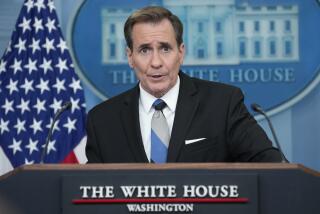High-Tech Sales to E. Europe Expected : Bush Reviewing Recommendations as Nations Shed Communist Domination
- Share via
WASHINGTON — The Bush Administration, in a move to help East European countries, is ready to ease restrictions on sales of high-technology computers and other telecommunications equipment, officials said today.
“The political and military environment is changing . . . . The situation is different today than it was a year ago,” said White House spokesman Marlin Fitzwater.
He said recommendations for easing the controls, made Friday at a meeting of the National Security Council, are under final review by President Bush.
Bush announced last month that he favored a relaxation of some of the restrictions on high-tech exports into Warsaw Pact nations.
Fitzwater called the proposal developed in response to that appeal “a prudent change . . . that will not jeopardize strategic interests.”
American experts are in London beginning discussions on a joint approach with British officials.
The discussions are in preparation for a meeting in Paris in mid-February of Cocom, the coordination committee for multilateral export control. There, the United States hopes to work out details of what kind of equipment will be cleared and how much of it.
Cocom, which includes all 16 NATO countries except Iceland, plus Japan and Australia, attempts to coordinate Western deliveries of technology to Eastern countries. The United States has been among the most reluctant to provide high technology to allies of the Soviet Union.
The countries likely to be assisted include Poland, Hungary and Czechoslovakia, all of which have shed Communist domination and are adopting capitalistic approaches to their weak economies.
The meeting in Paris is designed to adopt uniform rules to guide technology transfers. In this respect, the Administration’s decision to liberalize restrictions could be balanced against the more eager approaches of some other Cocom members and produce a compromise.
The net result, however, would be to deliver better computers and telecommunications equipment to members of the Eastern Bloc, provided semi-sensitive technology is not then turned over to the Soviet Union.
U.S. officials said the decision made at the National Security Council meeting applied directly only to Eastern Europe and not to the Soviet Union. But, the officials said, the principle--aiding countries as they adopt Western-style economies--could eventually be extended to Moscow.
Cocom decisions are taken by consensus, and the 17 members try to act in unison. Still, if the United States had held out against liberalization, there was always a chance one or several of the other countries “would go off on their own in this time of extraordinary change,” a U.S. official said.
“There is some difference of view how far and how fast we should go,” he said.
More to Read
Sign up for Essential California
The most important California stories and recommendations in your inbox every morning.
You may occasionally receive promotional content from the Los Angeles Times.













